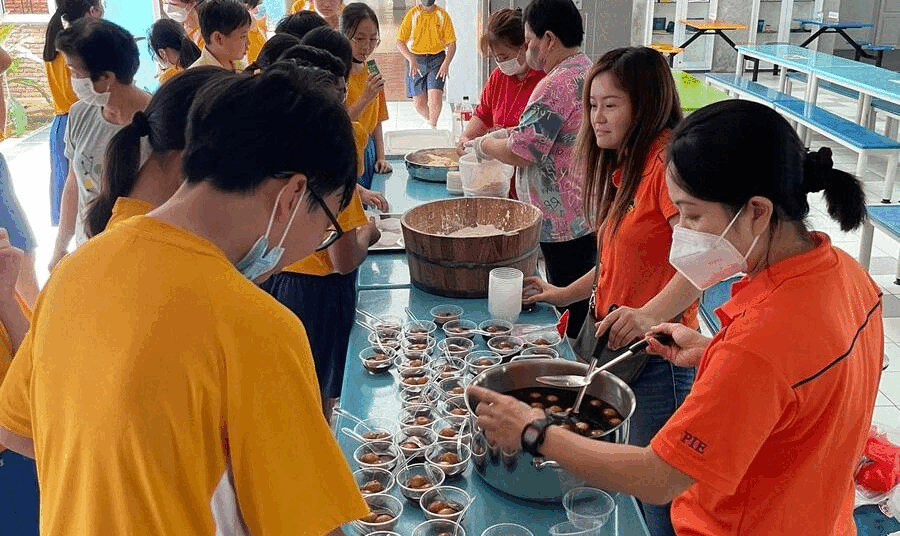Key Programmes
Key Programmes

Chinese Language
Chinese Language Talent Programme
The program aims to groom and nurture students proficient in the Chinese language across all streams by exposing them to out-of-classroom activities such as competitions, theater performances, and learning journeys.
Language and Cultural Immersion Programme (Internationalisation Trip)
• Secondary 3 Fairsians embark on a week of overseas experiential learning as part of the Sec 3 FLEX programme. For the past few years, students have visited schools in China and Taiwan, also playing host to their Chinese and Taiwanese counterparts when they visit Singapore.
• The trip aims to enrich Fairsians’ global and cultural awareness, and at the same time sharpen their command of the Chinese language through interaction with the locals. Fairsians immerse themselves in Chinese culture not only through classroom experiences, but also through close interaction with the buddies that they are paired up with for the programme, thus fostering international friendships and broadening the students’ global perspectives.
Mother Tongue Fortnight Activities
The department organizes various cultural activities, including traditional games, food appreciation, Chinese calligraphy, and paper cutting. These activities, combined with specially designed classroom lessons, help deepen participants’ understanding of their ethnic culture.
Malay Language
Promoting Connect, Nurture and Inspire Framework in T & L
• Building positive relationships with students is the foundation for Connect, Nurture and Inspire. Activities are challenged to inspire students to learn Malay Language beyond the classroom and examination. Setting rules, respect and routines are done to lay the foundation of teaching and learning. Thinking routine, peer evaluation and Thinking Culture are applied to strengthen collaborative learning among students. Research, Real-world task, Student Initiated learning project and Experiential Learning as well as Inquiry-Based Learning are exploited to highlight students’ strength and abilities. The application of the framework is to inculcate a sense of ownership and self-directed learning.
Real World Task and Experiential Learning
• Students are constantly challenged to explore beyond the textbooks through self-directed or collaborative class research. This allows students to direct their focus in the given topic towards their interest. Students were guided through their research with Inquiry-Based Learning to create questions to concepts unknown to them and working towards finding answers to their questions.
• The Lower Secondary students explore the concept of adab (mannerism) in the Malay culture by the appropriate use of pronouns in different contexts and differing persons. Students also explore the change in food trend that involves traditional food being fused with Western food which ends with a mini debate on the notion that traditional food should be transformed to continue being in relevance.
E- Pedagogy
• The Upper Secondary students use Digital Affordances to increase student to student collaboration. These approaches make students’ thinking visible and allow for collaborative learning through peer feedback. Students use digital affordances to create questions for their peers, which become their learning resources. They provide feedback to one another, thereby refining their own understanding. In the process, students also learn about good netiquette as well as self-directed learning is inculcated amongst students.
Assessment for Learning (AfL) in Narrative Writing for Lower Secondary
• Application of AfL strategies are applied to value-add Lower Subject-Based Banding for Normal (Technical) students in narrative writing. The purpose of the task is to provide feedback to both teachers and learners regarding the learner’s progress towards achieving the learning objectives. This feedback is used to revise and develop further learning instructions for students. Students do self and peer evaluation using a checklist, storyboarding and gallery walk to enhance their learning through a student-directed approach.
Differentiated Instruction in Expository Writing for Upper Secondary
• Differentiated Instruction routines and approaches are adopted in the Secondary Three lessons. Differentiated Instructions that match students’ developmental level and skills in learning process enable the students to write a quality expository writing based on the SEAB marking scheme. By differentiating the learning process, it allows the students with varied abilities to work at their own pace, to take their learning more in-depth by analysing, evaluating or synthesising information. The information is then used to solve a real world application problem.
Participation:
- “与声剧来“中文广播创作比赛 ‘Script It Right’ Chinese Radio Drama Script Writing
- “新空下”全国学生新谣歌唱及创作比赛 ‘Xin Kong Xia’ National Schools Xinyao Singing and Songwriting Competition
- 华文大比拼 National Chinese Challenge
- 全国课文朗诵比赛 National Text Recital Competition
- 新蕾奖 Chinese Creative Writing
- 全国翻译比赛 National Secondary School Translation Competition
- Cinta Halynaa Malay Language Translation Competition

